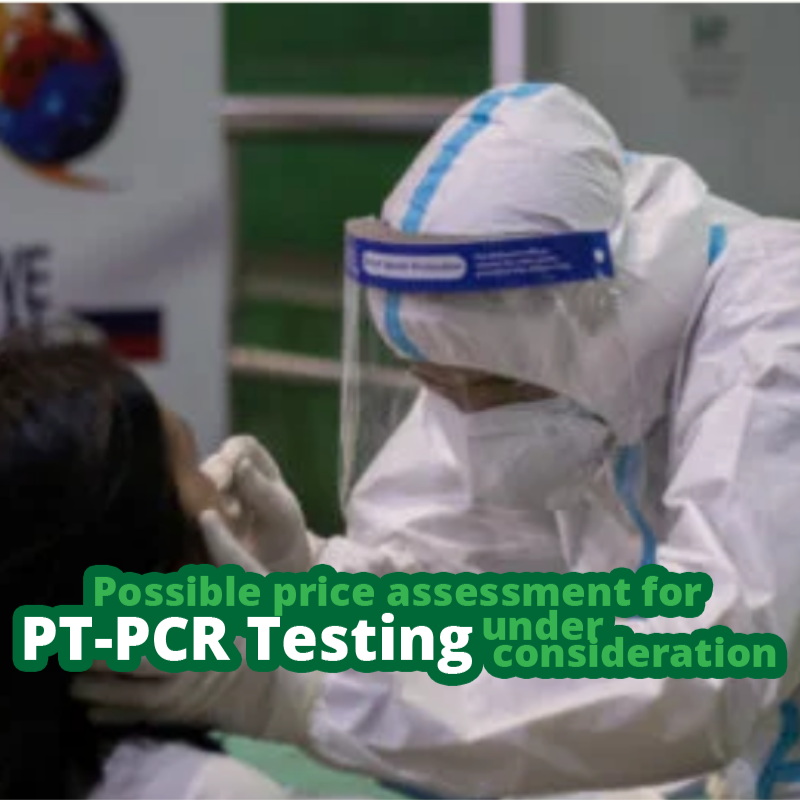Investment, Financial, Philheath
Affordable RT-PCR Testing: Price Adjustments Under Review 2022
Possible price assessment for RT-PCR testing under consideration
The COVID-19 pandemic has underscored the critical role of widespread testing in controlling virus transmission and protecting public health. RT-PCR testing, considered the gold standard for detecting COVID-19 infections, has been a crucial tool in the country’s pandemic response. However, concerns over the affordability and accessibility of these tests have sparked debates among government officials, healthcare institutions, and the public. With varying prices across testing facilities and reports of overpricing, many Filipinos are calling for stricter regulations to ensure that testing remains within reach for all, especially during surges in cases.
As the government revisits policies on RT-PCR testing, balancing affordability with sustainability becomes a key challenge. The Department of Health (DOH), PhilHealth, and other relevant agencies must work together to prevent excessive pricing while supporting healthcare providers in maintaining efficient and reliable testing services. With new COVID-19 variants emerging and cases fluctuating, a comprehensive and long-term strategy for testing must be in place to safeguard public health and ensure that no Filipino is left behind in the fight against the pandemic.
Government Response to Rising COVID-19 Cases
Monday, 28th day of December 2021, Acting Presidential Spokesperson and Cabinet Secretary Karlo Nograles suggested a reassessment of RT-PCR testing prices during ANC’s Headstart due to the surge of new COVID-19 cases in the country.
Nograles said, “Maybe we can start assessing the prices again, although we went through that cycle, we went through cycles of putting those caps on the RT-PCR. So maybe, it can be something that we can explore again or the [Department of Health] can explore again.”
His remarks were based on the public’s concerns regarding hospitals turning their RT-PCR testing into private business.
RT-PCR price caps nowadays range from around P1,000 to P3,000.
However, Nograles assured in his interview that PhilHealth shall cover RT-PCR testing conducted in hospitals. The public shall only pay when they request RT-PCR testing voluntarily for their protection, safety, or if they have symptoms.
According to the Department of Health (DOH), out of 26,122 individuals tested last December 31, 2021, 19.6% tested positive. They also mentioned that the data was higher than the World Health Organization’s (WHO) positivity rate benchmark of five percent or lower.
Health experts have warned that with the increasing positivity rate, affordable and accessible testing is crucial to containing the spread of the virus. They emphasized that reassessing RT-PCR prices should not only focus on capping costs but also ensuring the availability of testing centers, particularly in underserved areas where access to healthcare services is limited.
In response to the calls for price reassessment, the Department of Health and other government agencies are expected to conduct further evaluations and consultations with private laboratories and healthcare institutions. This initiative aims to strike a balance between making RT-PCR tests more affordable for the public while ensuring that hospitals and diagnostic centers remain financially sustainable.

Public Concerns and Transparency Issues
The rising number of COVID-19 cases has once again fueled concerns about the accessibility and affordability of RT-PCR tests. Many Filipinos have voiced frustrations over inconsistent pricing across hospitals and laboratories, with some establishments allegedly charging significantly higher than the mandated price cap. This has raised questions about transparency in pricing and the accountability of private healthcare facilities when it comes to public health services.
Consumer advocacy groups have called for stricter regulations to prevent overpricing and ensure that RT-PCR testing remains accessible to all, particularly for lower-income households. They argue that testing should not be a financial burden, especially during a surge when early detection is crucial in preventing the further spread of the virus.
Moreover, some citizens have expressed concerns about potential profiteering, with reports of private laboratories prioritizing clients willing to pay higher fees for expedited results. This has led to calls for clearer government intervention to standardize both pricing and turnaround times for test results, ensuring that all individuals, regardless of financial status, receive timely and affordable testing.
In response, health officials have reiterated their commitment to monitoring compliance with price caps and warned that facilities found overcharging patients may face sanctions. The Department of Health and the Department of Trade and Industry have been urged to strengthen enforcement measures, such as conducting random inspections and imposing penalties on establishments that fail to adhere to regulations.
PhilHealth’s Role in Testing Accessibility
PhilHealth has been under scrutiny for its handling of COVID-19 reimbursements, with hospitals previously expressing concerns about delayed payments. While the agency reassured the public that RT-PCR tests conducted in accredited hospitals would be covered, there remain doubts about the efficiency and timeliness of claim processing.
To address these concerns, PhilHealth officials have been urged to improve their reimbursement system and expedite payments to healthcare providers. By streamlining the process, hospitals will be able to continue offering free or subsidized RT-PCR testing without financial constraints that may force them to increase prices.
Additionally, some healthcare institutions have called for increased transparency in PhilHealth’s reimbursement procedures, citing the need for clear timelines and public accountability. Without a reliable payment system, hospitals and laboratories may hesitate to accommodate PhilHealth-covered patients, ultimately limiting access to testing for those who rely on government support.
To ensure the sustainability of free or subsidized testing, policymakers and health officials have been discussing the potential allocation of additional government funding. Strengthening PhilHealth’s financial position and enhancing oversight mechanisms could help rebuild public trust and guarantee that COVID-19 testing remains accessible, especially during periods of heightened transmission.

The Need for Sustainable Testing Strategies
Health experts emphasize that long-term strategies for COVID-19 testing should go beyond periodic reassessments of price caps. Some have proposed the expansion of government-funded testing centers to reduce reliance on private facilities and ensure that free or affordable RT-PCR tests remain widely available.
Additionally, calls for increased production and distribution of antigen test kits have gained traction, as these tests provide a faster and more affordable alternative for detecting COVID-19 infections. While RT-PCR remains the gold standard, making other testing options more accessible could ease the financial strain on Filipinos seeking COVID-19 screening.
Public health advocates also highlight the importance of integrating routine COVID-19 testing into the country’s healthcare system, particularly in workplaces, schools, and high-risk communities. By implementing systematic surveillance testing, authorities can identify and contain outbreaks more efficiently, reducing the overall burden on hospitals and minimizing economic disruptions.
Moreover, government collaboration with the private sector could further enhance testing accessibility. Partnering with pharmaceutical companies, diagnostic laboratories, and international health organizations may allow for more affordable testing supplies and expanded testing coverage, ensuring that Filipinos—regardless of economic status—have equitable access to necessary health services.
Moving Forward: Strengthening Public Health Measures
As the country continues to navigate the challenges posed by the pandemic, ensuring affordable and accessible COVID-19 testing remains a top priority. The government’s next steps in reassessing RT-PCR pricing, addressing transparency concerns, and strengthening PhilHealth’s role will play a critical role in the country’s pandemic response.
For now, public vigilance and government accountability are essential in ensuring that no Filipino is denied access to testing due to financial constraints. The coming weeks will determine whether price adjustments and policy changes will be implemented to make testing more equitable for all.
Beyond testing affordability, experts emphasize the need for a more proactive and resilient healthcare infrastructure that can withstand future public health crises. Strengthening hospital capacities, investing in research for more cost-effective diagnostic tools, and reinforcing contact tracing efforts will be crucial in mitigating the long-term impact of the pandemic. A holistic approach to healthcare preparedness will ensure that testing remains accessible even in the face of new variants or potential outbreaks.
Furthermore, fostering public-private partnerships can help bridge gaps in testing availability and affordability. Encouraging collaboration between government agencies, private healthcare providers, and international health organizations can lead to sustainable solutions that benefit all sectors of society. With a concerted effort from all stakeholders, the Philippines can build a more inclusive and effective public health system, ensuring that every Filipino has access to the necessary medical services in times of crisis.
Conclusion
Ensuring equitable access to COVID-19 testing is not just a short-term necessity but a long-term commitment to public health resilience. As the government reassesses RT-PCR pricing and strengthens healthcare policies, a balance must be struck between affordability and sustainability. Transparent pricing, efficient reimbursement systems, and expanded testing options will be key to preventing future disparities in healthcare access. Moving forward, a proactive and well-integrated approach—one that prioritizes both government action and public cooperation—will be essential in safeguarding the nation’s health and economic stability against ongoing and future health crises.
READ MORE RELATED BLOGS!
READ MORE AND SHARE!
TSOK Chronicles: Unleashing Passion, Dedication, and Excellence in 2024
2023 Your Practical Wedding Guide
Investments and Finance Ultimate Guide
If you like this article please share and love my page DIARYNIGRACIA PAGE Questions, suggestions send me at diarynigracia @ gmail (dot) com
You may also follow my Instagram account featuring microliterature #microlit. For more of my artworks, visit DIARYNIGRACIA INSTAGRAM

A multi-award-winning blogger and advocate for OFWs and investment literacy; recipient of the Mass Media Advocacy Award, Philippine Expat Blog Award, and Most Outstanding Balikbayan Award. Her first book, The Global Filipino Bloggers OFW Edition, was launched at the Philippine Embassy in Kuwait. A certified Registered Financial Planner of the Philippines specializing in the Stock Market. A recognized author of the National Book Development Board of the Philippines. Co-founder of Teachers Specialist Organization in Kuwait (TSOK) and Filipino Bloggers in Kuwait (FBK). An international member of writing and poetry. Published more than 10 books. Read more: About DiaryNiGracia

 FREE DOWNLOAD NOW!!!
FREE DOWNLOAD NOW!!!

Peace and love to you.